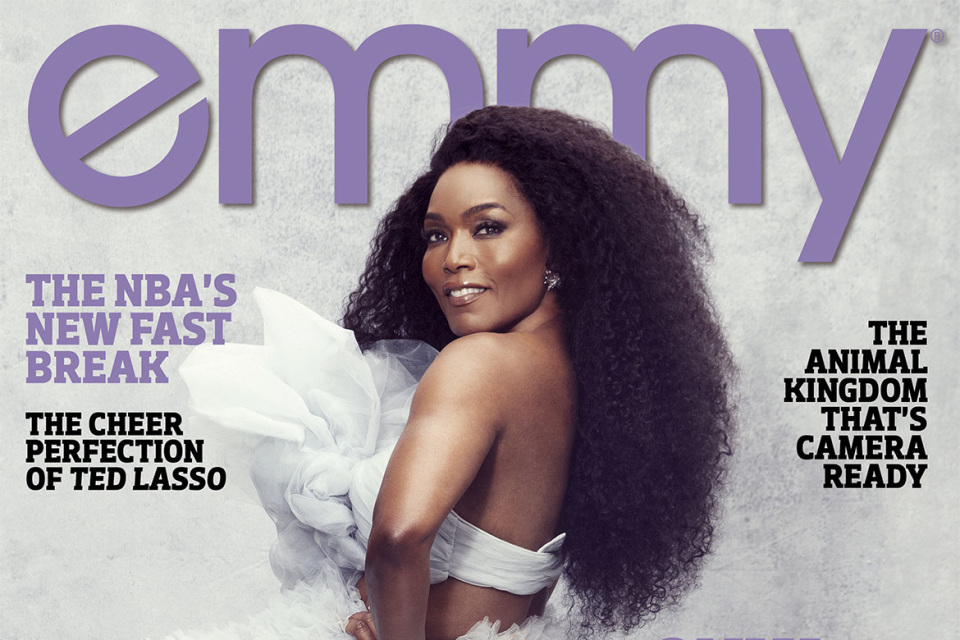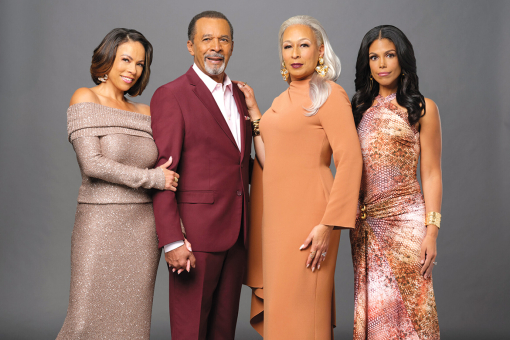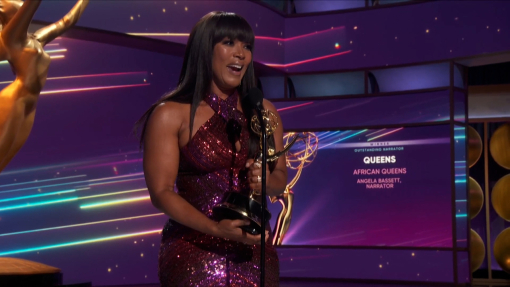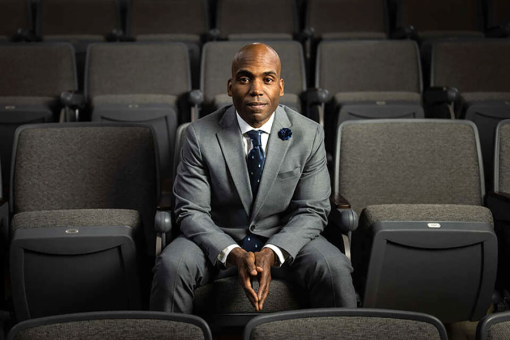Robin Thede has a story about Angela Bassett.
For her HBO series, A Black Lady Sketch Show, Thede envisioned a support group for imposingly glammed-up, lipstick-y women who have a horror of showing their unadorned faces in public. She modeled the leader of the therapy session — a fierce and supremely confident woman — after Bassett.
"We kind of painted ourselves into a corner because it couldn't really be anyone but her," says Thede, who dashed off an email asking Bassett to appear in the first episode. Bassett didn't just say yes, she surpassed the wildest expectations of Black Lady's creator–executive producer–writer– star.
It's not just the dangly earrings, impeccable manicure and spray of long hair that make the performance. In a glorious display of her trademark restraint, Bassett sells every single syllable of her dialogue, getting laughs with a raised eyebrow and a serene "don't-you-dare-defy-me" voice.
"She gave this woman so much respect and a stoic nature that made it so much cooler," Thede says. "And that's something only Angela Bassett can do."
Bassett is known for her air of strength and natural solemnity — as showcased in her Oscar-nominated turn in What's Love Got to Do with It — but not necessarily for being funny.
The fact that she was onscreen for less than four minutes, yet nabbed an Emmy nomination as guest actress for the sketch, proves Thede's point. "That's just the power of Angela Bassett," she says. "She can show up for a half a day and get nominated for an Emmy because she's that good, and she deserves it."
She was up for an Emmy again in 2020 (her seventh nomination), for narrating Disney+'s The Imagineering Story. Meanwhile, she's in her fourth season as the star and an executive producer of Fox's 9-1-1.
The procedural, which revolves around a handful of first responders in Los Angeles, is famous for its news-of-the-weird calamities — a girl choked by her pet boa constrictor, a premature baby trapped inside a toilet pipe.
Bassett's gravitas helps anchor the series and make its events seem almost normal. Her steely LAPD patrol sergeant, Athena Grant, balances a demanding job, two kids (Corinne Massiah, Marcanthonee Jon Reis), a hot new firefighter husband (Peter Krause) and an ex (Rockmond Dunbar) who identifies as LGBTQ.
That she has so much going on is no coincidence. Long before Thede dreamed up a role that only Angela Bassett could do justice, prolific showrunner Ryan Murphy had done the same.
As 9-1-1 showrunner Tim Minear tells it, before Murphy left for Netflix, he created the series as a goodbye gift to Dana Walden, who was then co- head of Fox Television.
"We were walking around the lot and he said, 'I had this idea about a show we should call 9-1-1, and there can be a 911 operator. And I think that Angela Bassett should be a cop. I think America wants to see Angela Bassett in a uniform,'" Minear recalls. "We built the show around her. She was on the billboard in our heads from Day One."
There was no completed script or even a fully fleshed-out character, but Bassett accepted the part. To understand this act of faith, rewind to 2013, when Murphy requested a meeting with her.
At the time, she had never met Murphy and knew almost nothing about his oeuvre. She expected one of those cursory getting-to-know-you's, but felt it was only polite to steep herself in his hit musical show, Glee, and the first season of his lurid anthology, American Horror Story. "I thought, 'Wow, how did I sleep on this show?'" she says.
Bassett remembers how quickly the meeting turned from light chit-chat to a solid job offer. "He started talking about witches and covens and New Orleans, and I piped up and said, 'Marie Laveau,' she recalls, referring to a real-life snake-charming voodoo priestess from the 1800s who is still legendary in the Big Easy. "When I left the office that day, it was on. I was on the way to New Orleans shortly thereafter."
In 2014, Bassett was Emmy-nominated for Coven; she remained on the tilt-a-whirl carnival ride that is American Horror Story for five seasons. During that stretch she played a blood-sucking Blaxploitation headliner (Hotel) and an alcoholic actress (Roanoke), then popped up again as Marie Laveau in Apocalypse. But she was still surprised when she excitedly cracked open her script for Freak Show and saw what awaited her.
"We had such a great season with Coven and I was like, 'What can top this?' Then I read it and there it is — she has three breasts and a ding-a-ling," says Bassett of Desiree, her tough, implacable, intersex character. "That was something I'd never seen before. I remember literally tossing the script on the sofa and thinking, 'Ooooo-weee. I got to get up and walk around for a minute.' They shocked me with that one."
But she hadn't come this far to be cowed by prosthetic-enhanced cleavage. "I thought, 'I'm in this game, so I guess I'm gonna play.' And you know what? I had a ball."
A memorable highlight: mastering and performing Desiree's spinning tri-tassel dance. "At the end of the scene, the entire crew, majorly male, broke into spontaneous applause," Bassett recalls. "I felt quite accomplished — and a wee bit ashamed at the same time."
Born in Harlem, Bassett was sent at age ten10 months to North Carolina to be raised by her father's sister, Aunt Golden. Asked to trace the special sort of unflappable fortitude that she radiates onscreen, she points to her upbringing in St. Petersburg, Florida, where she relocated at age four to live with her social-worker single mother, Betty, and her younger sister, D'nette.
"Maybe it's just an amalgamation of how I was raised, who raised me, where I'm from, history and timing," she says. "Growing up in the '60s, you know, during those turbulent times, you had to have fight and grit. It also might be about growing up without a lot of extras, but what you have is clean, it's what you can afford. You know, just sort of learning what your values are."
She knew her mother wanted her to get a college degree. But it wasn't until the 11th grade that how to apply and to which universities came into focus. "As a teenager, counseling wasn't available to me," she says, adding that it was a director at Upward Bound, a summer enrichment program, who pointed her toward Yale.
Though she'd been a straight-A student in high school, her first year on the New Haven campus required a level of determination that wasn't always easy to summon. "It was overwhelming, and I didn't know the avenues that were available to me, that there were tutors," Bassett says.
She recalls the many nights she spent in her dorm room weeping and giving herself "a good talking-to," noting, "It was a two-way conversation. I'd stand in front of my mirror and say, [impatiently] 'Are you going to quit?' and then I'd answer, [sob-choked voice] 'No.' Then it would be, 'Okay, how long do you want to cry? Fifteen minutes?' Then I'd say, 'Yeah, fifteen.' Then it would be 'Okay, fifteen minutes, then stop, wash your face and do whatever it is you have to do.'"
By the time she entered the workforce, she had a bachelor's degree in African-American studies from Yale and a master's in fine arts from the fabled Yale School of Drama.
She landed appearances on soaps like Search for Tomorrow, a Kentucky Fried Chicken commercial and a tour with the New York–based Negro Ensemble Company. Bassett took what came her way — bit parts as a prostitute or a clipboard-carrying nurse. But she always knew, even then, that sometimes you walk away.
"Early on I auditioned for a small, small part where a character takes this woman's head and pushes it down into a bowl of dog food," she says. "There I was, living in my $213-a-month apartment and thinking, 'If I don't take this role, I'm at the unemployment office.' But even though I was just starting out, I knew I could not be so desperate.
"I thought, 'I'd rather stand in that line than take something that would degrade Black women or the Black female experience.'"
Her first film industry break came in 1991, when director John Singleton cast her as a mom in Boyz n the Hood . But her turning point, the dramatic experience that changed everything for her, was a year later in the science-fiction comedy horror film Critters 4. If you're laughing, she's okay with that.
"In most movies, if you are the Black woman, you are the girlfriend to the best friend of the white guy who is the lead," she explains. "But in that little low-budget movie that I think we filmed at a Smart & Final [market] in Los Angeles, I was one of the leads. I didn't disappear after the first act. I didn't die. I wasn't the sacrificial lamb.
And it was shot out of sequence, so I could use it as a training ground, figure out how to craft a character that way. And if I fell on my face, it wouldn't be in front of the whole world. Just fans of the Critters franchise — and they were on number four, so there had to be some."
Think about it: just a couple of short years after Critters 4, Bassett would star as Tina Turner in What's Love Got to Do with It, land an Oscar nomination and become the first African American to win a Golden Globe for Best Actress in a Motion Picture — Comedy or Musical. ...
For the rest of the story and more photos, pick up a copy of emmy magazine HERE
Go behind the scenes of emmy’s cover shoot with Angela Bassett HERE.
This article originally appeared in its entirety in emmy magazine Issue No. 1, 2021











